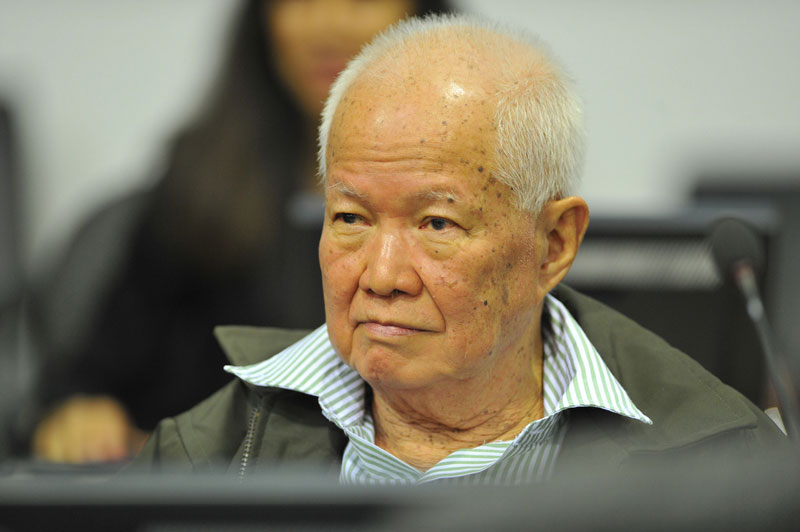Khmer Rouge tribunal defendant Khieu Samphan, in a rare address to the court Tuesday, once again denied having any knowledge of some of the regime’s bloodiest behavior.
The former head of state for Democratic Kampuchea (DK) rose to his feet to deny that he was responsible for any of the torture or murder committed at Takeo province’s Tram Kak cooperative and its Kraing Ta Chan prison, the current focus of the tribunal’s Case 002/02 against him and the regime’s second-in-command, Nuon Chea.
He also asked that his defense team be allowed to present evidence of the Khmer Rouge’s nationwide policies on cooperatives after he was urged to focus only on the regime’s “model district.”
“I would like to appeal to the chamber to allow my counsel to make [a] key document presentation…that is on the policy of the DK,” he said. “And on the contrary, I have been accused of [being] part of a joint criminal enterprise although I did not know anything about what happened at Kraing Ta Chan or at Tram Kak cooperative.”
Arthur Vercken, one of his lawyers, struggled to convince the judges to let him cite from the regime’s magazine on its cooperative policies, arguing that the article was relevant to Tram Kak district because it addressed some of the Khmer Rouge’s core doctrines. Though the judges eventually relented, Mr. Vercken refused to proceed, claiming too much time had been lost arguing the point.
At the end of the day’s proceedings, Trial Chamber President Nil Nonn asked Khieu Samphan, who along with Nuon Chea has refused to answer questions from witnesses, if he was waiving his right to remain silent.
“I’d like to maintain my right to remain silent,” he replied. “However, when I need to provide my clarification to the Chamber I’d like the Chamber to grant me the floor.
“Please do not mention that my counsel does not have the ability to prepare the documents. We have been interrupted on so many occasions,” he added, before the judge interrupted and instructed him to sit down.
During the day’s morning session, Victor Koppe, one of Nuon Chea’s lawyers, questioned the authenticity of some of the reports relating to Tram Kak and Kraing Ta Chan prison.
“These documents, if forgeries, seem to be made after 1979 as a means of constructing the narrative of what occurred at Kraing Ta Chan,” he said.
He cited a 2009 interview in which Youk Chhang, director of the Documentation Center of Cambodia (DC-Cam), says that Prime Minister Hun Sen was the source for some of the reports.
Mr. Koppe also questioned the assumption that the terms “reeducation” and “smash” were synonymous with murder, noting for example that people would sometimes return to their communes after being reeducated.
Hearings will resume on Thursday.




